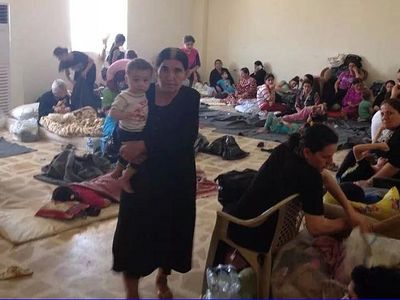SOURCE: JewishJournal.com
By Simone Wilson
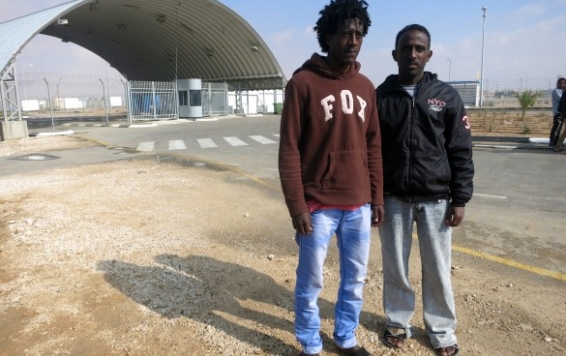 Holot prisoners Daniel Angosom, 21, and Filmon Mengstab, 27, were tortured by Bedouin kidnappers in the Sinai Desert before being picked up by Israeli soldiers along the border fence. The Israel Prison Service has held them in captivity for over a year now.
Holot prisoners Daniel Angosom, 21, and Filmon Mengstab, 27, were tortured by Bedouin kidnappers in the Sinai Desert before being picked up by Israeli soldiers along the border fence. The Israel Prison Service has held them in captivity for over a year now.
This was one of the sweetest, sunniest winter weekends I've seen pass through Tel Aviv. But walking the diagonal path that cuts across the Levinsky Park green in South Tel Aviv on Friday, something was off. The Eritrean and Sudanese asylum seekers who sit in Levinsky Park each day, waiting for work, good news, conversation or distraction — and some of whom also sleep in the park at night — seemed stormy, on edge.
We all know an end is coming. And as much as we will fight it and hope for a way around it, right now it's very real:
This morning, the first bus to Holot, Israel's new "open" prison camp for illegal immigrants, picked up a group of asylum seekers in the Nokia basketball arena parking lot in southeast Tel Aviv. They are being shuttled down through the Negev to the desolate Holot campus as I type. (However, reporter Daniel Roth wrote on Twitter that only 11 of the 65 asylum seekers ordered to report to Holot today showed up to the bus boarding. "The bus has departed," he Tweeted minutes later. "Friends and solidarity activists are devastated.")
In total, according to Israeli newspaper Haaretz, about 1,800 men from the African asylum-seeker community have been ordered to report to Holot in the coming weeks. Which means that about 1,800 men who have lived here for up to eight years are now counting down the days until they will board a bus in the Nokia basketball arena parking lot and begin an uncertain stint in captivity. Many more believe they'll be receiving their invites soon. And although the prison's capacity is currently 3,300, Israel's Channel 7 reported that it "can be expanded to hold as many as 11,000."
Basically, as I reported in this week's print edition: Rather than arrest individual African asylum seekers who have committed street crimes and try them in court, the government is sending them to Holot en masse for the crime of infiltrating Israel’s border fence.
These men don't know if they will ever see Tel Aviv again. Visions of Holot — or at least what they've glimpsed of it in photos, and heard about it through friends who've had the misfortune of witnessing it firsthand — have replaced any dreams they may have had for their futures as refugees taken in by a free and democratic country. At a rally in Levinksy Park last week, worried whispers of "Holot" ran through the crowd like an uninvited ghost. One man had torn out a few stories about Holot from Hebrew-language newspapers, and was examining the photos with a frown. A couple other groups of asylum seekers went through the letters summoning them to Holot line by line, translating where necessary.
It may seem strange to outsiders, but over the past eight years or so, this neighborhood has become an unlikely home for about 35,000 of Israel's 55,000 asylum seekers — mainly Christians and Muslims who fled violent and authoritarian regimes Eritrea and Sudan. (They are also concentrated heavily in the southern resort town of Eilat.) I felt like I'd been teleported to northern Africa when I first moved to the Neve Sha'anan neighborhood of South Tel Aviv one year ago. But like me, they're a part of this city now, and I feel sick when I imagine walking to the Central Bus Station without hearing their music and their language, passing their shops, sharing their food.
Protests at Israeli consulates around the world and a week-long workers' strike that rocked Israel's service industry have done nothing to sway Prime Minister Benjamin Netanyahu and Interior Minister Gideon Sa'ar from their mission to drive the "illegal infiltrators" back to Africa. But because international law bans Israel from forcing them onto planes back to Eritrea and Sudan, Netanyahu and Sa'ar apparently hope to drive the asylum seekers into such psychological despair that they choose to go back themselves, with $3,500 in Israeli government cash in their pockets.
Speaking to an African asylum seeker about Holot feels like talking to someone about their execution date. After Holot, the screen will go black. How do you have a casual conversation about something so terribly life-altering?
Below, meet five of the hundreds of Eritrean and Sudanese men currently bracing themselves for Israel's final solution.
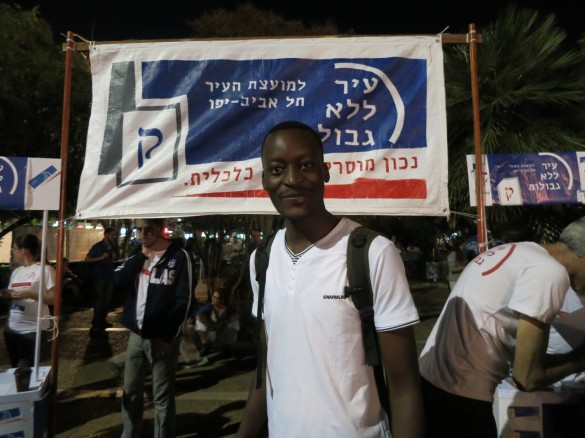
I first met charismatic Darfuri community leader Mutasim Ali, 27, at the annual memorial rally in North Tel Aviv for assassinated Israeli Prime Minister Yitzhak Rabin. (He is pictured above at said rally, during his historic campaign to become the first African refugee on the Tel Aviv City Council.) Ali, who has lived in Israel for four years, was the only asylum seeker present at the October event — a devoted activist for months before the community rallied around him by the tens of thousands this January.
At the rally, Ali told me: "Rabin believed in dignity; he wanted everybody that goes to work to feel respected in this world. And in terms of asylum seekers, there is something that needs to be very clear: They came looking for protection. They want to give back to their country. ... There is an opportunity to make some changes here, if we believe in the vision of Rabin."
Along with around a dozen other key African organizers, Ali built momentum for the game-changing January protests by posting fliers, sending out Facebook and text alerts and holding daily planning meetings in Levinksy Park. (A recent Times of Israel feature tracked the remarkable evolution of the movement, and Ali's central role in it.)
But all that may soon come to a halt. Ali was summoned to Holot earlier this month: He told me over the phone that he must report to the prison by Feb. 3. Yet somehow, he wasn't letting his sentence get him down. "I’m not thinking about it yet, because I still have one long month,” he said. “Right now, I’m thinking about those who go before me, in the next few days. We have a lot of work to do.”
Israel-Palestine expert and popular Twitter personality Max Blumenthal posted a photo of Ali holding up his Holot papers yesterday. "Mutasim Ali, 1st non-Jewish African to run for Tel Aviv city council, was just ordered to the Holot internment camp," wrote Blumenthal. The status was re-Tweeted over 100 times.
Ali is currently working with other leaders in his community to devise a group strategy in response to the Holot roundup. (And if anyone can do it, this man can.)
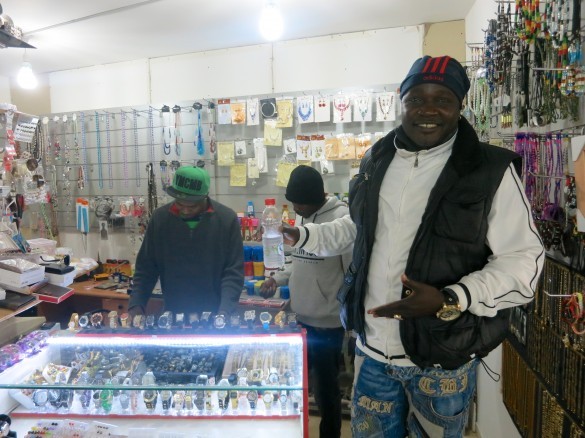
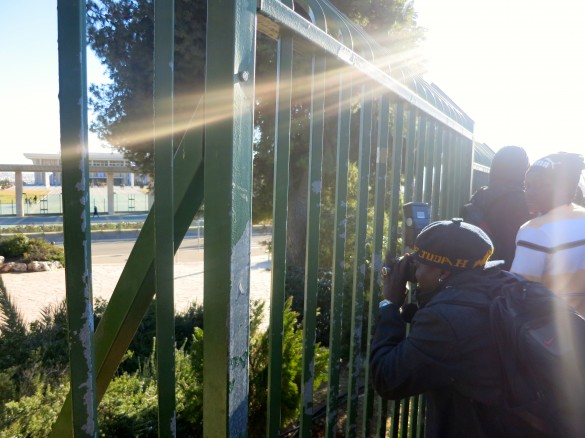
Muhamad Musa, a 35-year-old asylum seeker from Darfur who has lived in Israel for six years, owns a popular watch and jewelry shop in the Central Bus Station. (Above, Musa is pictured in his shop, and below, he is pictured photographing the Knesset building at a refugee rally in Jerusalem.)
Up until a year ago, Musa ran his four-year-old shop on a street near Levinsky Park, but he found rent to be much cheaper and the customer flow more steady inside the dilapidated, half-empty Central Bus Station. When I visited him on a recent Monday, as reported in "Who's Afraid of the African asylum seekers of South Tel Aviv?", Musa helped a stream of customers pick out pieces that suited them — including a young Israel Defense Forces (IDF) soldier in a kippah and an elderly Jewish woman, both of whom greeted him by name. A few of his friends from Sudan stopped by, too, calling him by his nickname, "Cash Money." (In tribute to all the bling in his shop.)
Musa was summoned to Holot about three weeks ago, and is looking at a Feb. 5 admit date. Around 20 of his friends have also received a letter, he said.
He described to me how the Ministry of Interior slowly closed in on him: They issued him a four-month work visa, he said, then a two-month work visa, then a one-month work visa. Then, three weeks ago, when he went down to the Ministry of Interior offices, he was summoned to Holot.
Whenever we talk about Holot, Musa calls it "Holon," the name of a Tel Aviv suburb — partly because it's a joke between us now, but partly because he feels more comfortable pretending he's just taking a short vacation south. "How is it there?" he asked me about Holot. (I had visited the week before.) He also asked if I thought he'd be able to travel back and forth to his shop.
That would be quite a stretch. Although inmates are technically allowed to come and go, they must check in to Holot three times a day. From what I've gathered, they are allowed to apply for 24-hour leave, but they need a good reason. And I imagine Musa would soon tire of the eight-hour round trip from Holot to Tel Aviv by bus.
Some 50 inmates at Holot reportedly left during the day and never returned. But according to Haaretz, "the police and the population authority are preparing an operation in coming days to locate and detain asylum seekers who didn’t report on the date they were required to." Plus, Musa said, “Everybody knows me here” — including Tel Aviv police, who would know where to find him if he didn’t show up to Holot on Feb. 5.
Like Ali, Musa is hoping his community can dream up some group solution before then. "If everyone goes, I go. If not, I don't go," he told me at the most recent rally in Levinsky Park.
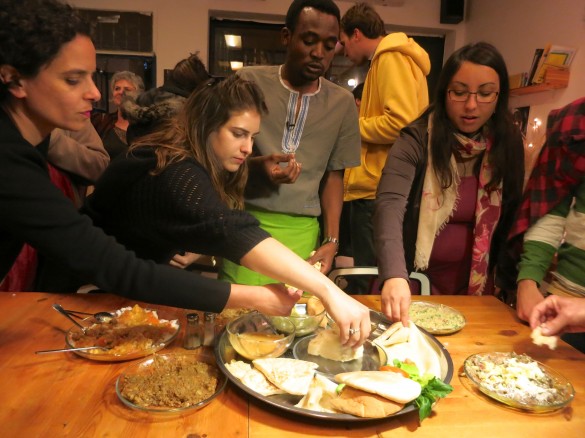
On Jan. 19, at a "Kitchen Talks" event held by the Tarnegol restaurant in Jaffa in celebration of Sudanese culture, asylum seeker and chefHassan Shakur, 26, was swarmed by news microphones.
Shakur has hosted workshops for Kitchen Talks before — a semi-annual event that tackles segregation in Tel Aviv by uniting African chefs and Israeli eaters — but this one was bittersweet. This one would double as his goodbye party.
For one more night at Tarnegol, he told the Jersalem Post (video above), "I will have a lot of friends and I will feel like I'm not an isolated person. I'm not going to feel loneliness. I feel like I'm in my home with many friends." He has been ordered to report to Holot in early February.
About four years ago, after Shakur's mother was killed by the Sudanese government, he fled to South Sudan, to Egypt and — finally — to Israel. Although he told reporters at the Jan. 19 event that he appreciates the safety he has found in Israel up to this point, he has always been very vocal about his end goal: to help heal his home country. "We shouldn’t concentrate on the past but live the present and plan for a better future, making sure that what happened in the past will never happen again," he reportedly wrote in his biography of genocide in Darfur.
In the meantime, Shakur has done his best to get to know Tel Aviv. “We are isolated,” he told Tablet Magazine at a Kitchen Talks event in July. “We are not integrated with the Israeli community. Maybe this way I can get to know more Israelis.”
In the Holot prison camp, as isolated a spot as one can find in the tiny nation of Israel, this crossing of cultures will become near impossible.
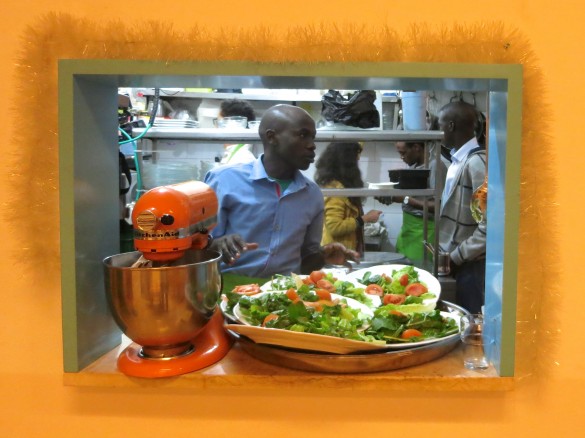
Adil Adam, 28, who called Darfuri chef Shakur his "best friend," is one of the warmest and outgoing dudes I’ve met in Israel. Adam picked me out of a crowd at the Kitchen Talks event and asked me if I was enjoying the food — much of which he cooked himself.
The food, for the record, was amazing. A mound of gooey Sudanese porridge — which tasted like raw dough, in the best way possible — was surrounded by an array of sauces, including bean dip covered in a layer of fried egg; an eggplant dip; and some sort of peanut sauce.
Adam, volunteering in the kitchen for the night, doesn't normally work as a cook, but as a gardener in a suburb of Tel Aviv. Adam explained that he originally fled Darfur because he belonged to a group of activists at his university who opposed the government. Although some of his colleagues were "tortured and killed," Adam managed to escape. “What I expected to find in Israel was at least education,” he said.
Instead, after three years working as a day laborer, he’s bracing himself for an indefinite term at Holot.
At the Jan. 19 event, he asked me if there was a school at the prison. (Inmates at Holot told me the only thing to do there is sleep, eat and watch the news on TV.) "What I'm afraid of is that there's no health service," he added. (Inmates at Holot told me that they must travel outside the facility to find health services. They also said that some of their fellow prisoners who appear to be going crazy — not eating or showering, and talking to themselves at night — have received no medical attention.)
Adam's admit day is Feb. 17.
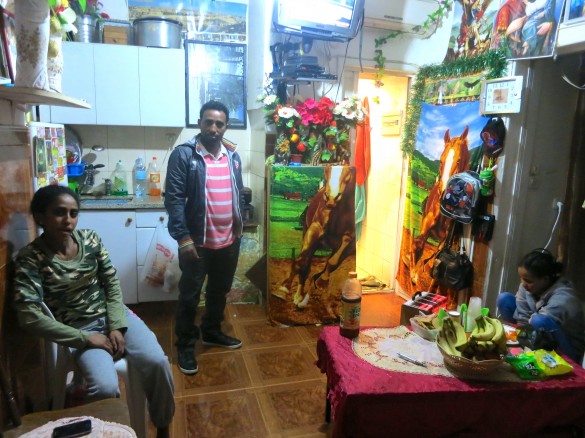
Tekle Hagous, 30, is an Orthodox-Christian asylum seeker who came to Israel from Eritrea seven years ago to escape indefinite military service and religious persecution. He's also one of the few lucky asylum seekers whose invitation to Holot has been canceled because he has a family here in Israel.
However, Hagous now faces another problem: The Ministry of Interior refuses to renew his work visa. So once his savings from working as a sushi chef for the last seven years — at Tel Aviv hotspots Japanika and Super Sushi — have dried up, he doesn't know how he will support his wife Terhas, her sister Bana (neither of whom have been granted work visas) and his one-and-a-half-year-old baby boy, Sami.
Last week, I visited the Hagous family in their teensy one-bedroom apartment in the Hatikva Quarter of South Tel Aviv, which they rent for a painful $860 per month. I sat on the sofa next to Sami, napping peacefully under a fleece blanket. A BBC news report on anti-government riots in Thailand blared on a small TV set hung over the refrigerator, while Terhas cooked a spongy Eritrean flatbread calledinjera on the stove.
When Hagous was summoned to Holot, he said he "felt very shocked. It makes you crazy."
He explained: "I cannot go back to Eritrea. The government of Israel also knows that we have a dictator and many, many problems. So it makes you shocked when they give you [an invitation to] Holot."
And now that he has been barred from making a living, Hagous is slowly going mad from the uncertainty of his family's future. He said he spends his days walking between the Ministry of Interior and NGO offices, trying to find some way out of his dilemma.
Bana, his wife's 21-year-old sister, said that sometimes her Russian-Israeli neighbors get angry at her: "They say, 'Why are you here? Go back to your country.'" She said she wishes that she could find somewhere to live where she could go to school, because she wants to be a doctor.
During our interview at his home, Hagous and his family discussed Rose Fostanes, the Filipina migrant worker who won this season of "The X-Factor Israel," and rising food prices in South Tel Aviv.
"Because I am a long time in Israel, I know everything Israeli," he said. (Hagous speaks Hebrew, Arabic, English and the Eritrean language of Tigrinya.) "I look at the television, I look at the news — everything. The same as the Jewish people."
If he was forced to leave Israel, he said, he would feel sad — kind of like he was leaving his second home.


